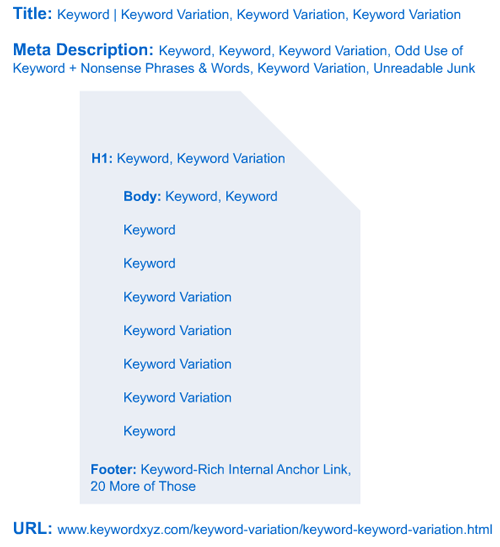
The Danger of Overdoing SEO
During my first few years in the SEO field, half of the sites I'd visit - those my SEO brethren in the forums or over email owned - were what today we'd probably call "over-optimized." They tended to have features like:
- Keyword after keyword stuffed into the title element of every page
- Overly-lengthy and keyword rich URL strings
- Page filled with "SEO'd" content that was never intended to be a focus for visitors
- Backlink profiles that lacked a single high-quality, "editorial" link
At its best, our profession is about making amazing things that people are asking to see (via their search queries in the engines) and then marketing it in the most optimal ways. At its worst (excluding the crap-hat junk that doesn't even deserve to be called "SEO"), it looks like this:

There's a gigantic gap between this type of "SEO" and the industry's best practices, but the individual recommendations and changes are so subtle that it's not surprising many practitioners go a bit overboard. After all, the process of starting SEO often looks like:
- Week 1: Notice in your analytics that search sends awesome traffic and start optimizing some meta tags (since you heard that's what SEO is about) by putting more keywords in them
- Week 2: See that those changes have had no effect, so begin doing some light reading on the topic
- Week 3: After you've glossed over a few SEO resources (perhaps not necessarily the best ones), start "optimizing" pages by filling the tags you've heard were important with your keywords, changing your internal links to be keyword-rich, placing more keywords on your pages in every conceivable tag and location, maybe even optimizing for some wholly bunk metric like the average keyword density of the top 10 ranking pages
- Week 4: Possibly see a bump in some rankings and, tragically, inheriting confirmation bias, convincing yourself that the strategy has worked and that it needs to be repeated.
- Week 5-20: Struggle with and eventually give up on SEO, or skate by on the fringes with equally poor quality linking practices that get many/most of your pages penalized but maintain rankings on a few
This pattern (or some similar variation) has played itself out in 9/10 stories I hear about folks who've jumped into the waters of SEO haphazardly - and honestly, it's hard to blame them. The engines provide just enough information to keep webmasters curious but unsatisfied. Many of the sites and pages that rank well do actually employ pretty spammy SEO tactics, making it hard for those trying to learn SEO by reversing their competition's success (temporary though it may be).
This doesn't just apply in the on-page world.
If you haven't yet read it, this thread from Reddit - My Job Was to Game Digg - and this one on Hacker News about it, are excellent examples of the perception problem that social media pushes for SEO have caused. This comment, in particular, stood out to me:

As you can see, the web's social voters and contributors have a passing tolerance for the "right" kinds of optimization, but a zealous abhorrence for those that violate their sense of propriety. Even if Google doesn't worry about "off-topic" linkbait, linkbaiters themselves should have cause for concern.
The engines aren't going to take it.
More and more, though, the engines are fighting back against this through changes like the Vince update (and subsequent focusing on brands as a way to sort out the web's "cesspool"). We've also recently seen a dramatic increase in the aggressiveness with which Google will change your titles, descriptions and negatively alter the rankings/visibility of sites that step over this line.
In the long run, it's hard to imagine Google allowing poor results to flourish - especially those who garnered rankings through manipulation. Those sites and pages that follow every single optimization tactic, from internal links to massive keyword focus to "perfect" anchor text in their off-site link building are going to stand out like sore thumbs to the engines. Sites that build pages designed to attract links with little to no relation to the host site will struggle against the biases in the social media world.
And sites/pages that abuse these practices (both on and off-page) are going to have a terrifically hard time earning "natural" links. The organic sectors of the web tend not to link out to those types of sites/pages if they can help it.
It might sound ironic, but there's an art to under-"optimizing" in order to achieve true "optimization."
p.s. Some folks noted they were hoping for a link to some good "best practices for on-page optimization" - here you go!
The author's views are entirely their own (excluding the unlikely event of hypnosis) and may not always reflect the views of Moz.



Comments
Please keep your comments TAGFEE by following the community etiquette
Comments are closed. Got a burning question? Head to our Q&A section to start a new conversation.